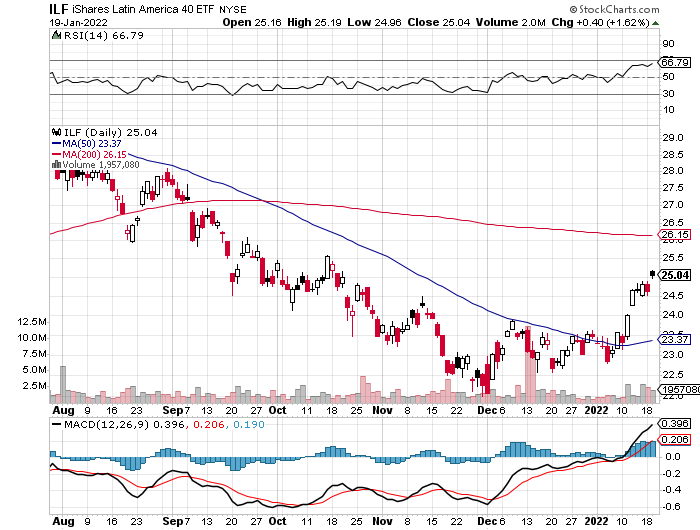Stock markets around the world have generally tumbled so far this year, but shares in Latin America and Africa are notable exceptions, based on a set of ETFs tracking the major equity regions through yesterday’s close (Jan. 19).
Selling has swept much of the world in equities year to date, but iShares Latin America 40 ETF (ILF) is an upside outlier. After a weak start in the new year, the fund has rallied and is now up 6.7% in 2022.

What’s buoying shares in Brazil, Mexico and Chile (ILF’s top-three-country holdings)? One analyst points to unusually low valuations as a catalyst. “The region’s PE10 [price vs. 10-year average earnings] is close to historic lows, suggesting the niche is a potential source of emerging value,” advises Mike Zaccardi at TopDown Charts.
Another factor to consider: ILF’s top-company holdings are led by materials and energy firms – sectors that are enjoying strength in several markets recently thanks to rising commodities prices.
ILF’s revival so far this year contrasts with a strong downtrend for the ETF in the second half of last year. But the relatively weak performance has been attracting attention as a possible mean-reversion candidate. A week ago, for example, I noted at The ETF Portfolio Strategist that ILF’s slide may have gone too far and so the fund appears ripe for a bounce.
Another upside outlier on a regional basis this year: VanEck Vectors Africa Index ETF (AFK), which is up 3.6%. The top-three country holdings: South Africa, Nigeria and Kenya account for nearly 60% of the portfolio.
Elsewhere in the world, selling has dominated. A global benchmark of shares is in the red by 3.5% so far in 2022, based on Vanguard Total World Stock Index Fund ETF Shares (VT). US stocks are faring even worse: SPDR S&P 500 (SPY) has shed nearly 5%.

Looking at the ETFs in the chart above through a momentum lens suggests that the current downside bias may be nearing an end, based on a set of moving averages (see chart below). Unless the global economy sinks into recession in the near future, there’s a case for thinking that the current slide in global equities is a technical correction rather than the start of a secular bear market. All bets are off, however, if the incoming economic data is weaker than expected.

Based on recent data, however, the global economy continued expanding at a moderate pace through December, based on the JP Morgan Global Composite PMI, a proxy for world GDP.

“We are seeing a loss of momentum in global growth concentrated in the services sector based on the December PMIs,” says Olya Borichevska, global economist at J.P. Morgan. “While manufacturing has been boosted by supply chain bottlenecks starting to moderate, services has felt the greater brunt of rising COVID cases, hurting consumer services providers in particular. The underlying dynamics of the survey still remain broadly solid.”
How is recession risk evolving? Monitor the outlook with a subscription to:
The US Business Cycle Risk Report